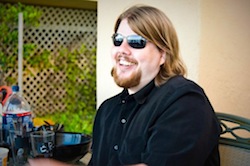Earl Newton worked as a freelance (and self-taught) writer, director and editor for almost ten years up and down the East Coast before making the move to Los Angeles. He lives in constant fear that a film school student will one day explain that “F-stop” doesn’t really mean what he thinks it means.
His username on Twitter is [@strangerthings](http://twitter.com/strangerthings).
——-
![]() Last week, I spent my thirtieth birthday as a director on a professional set in Los Angeles. Any concerns I had over turning thirty die off as I type that sentence.
Last week, I spent my thirtieth birthday as a director on a professional set in Los Angeles. Any concerns I had over turning thirty die off as I type that sentence.
Yet for the first 29 years of my life, I did literally everything I could to avoid LA and a career as a professional filmmaker. And I’m here to tell you why that hesitation — that waiting, born of reluctance — was the best thing that could have happened to me.
Young, dumb, and full of stay
—
 By the time I entered college in my tiny Florida town, I’d already decided I wouldn’t be moving to Los Angeles. While my friends shared fantasies of $2000 two-bedroom apartments and lives made of ramen noodles, I’d been infected by the Rodriguez disease, and I felt a furious, indignant independence. I wanted to make my own path, outside of Los Angeles.
By the time I entered college in my tiny Florida town, I’d already decided I wouldn’t be moving to Los Angeles. While my friends shared fantasies of $2000 two-bedroom apartments and lives made of ramen noodles, I’d been infected by the Rodriguez disease, and I felt a furious, indignant independence. I wanted to make my own path, outside of Los Angeles.
Also, it seemed expensive, and I knew I still had a lot to learn. Having been home-schooled, I was already comfortable with self-education, and struggling to survive in a major city just to learn the basics seemed like going to Harvard to take English 101.
Also, I’d been rejected from film school three times and I was terrified I’d move to Los Angeles and fail immediately.
Such is youth.
I had a bit of money to invest in my education, partially from an inheritance and partially from a loan co-signed by my parents. With it, I bought my first camera (a Sony DCR-TRV 510) and a Dell computer for editing (MotoDV Firewire card sold separately). For just about $3,100, I had the equivalent filmmaking power of an iPhone.
When you are poor and poorly connected, you exploit the only teaching resources you have available: books and practical experience. There are three books I recommend to any filmmaker: [Backwards and Forwards](http://www.amazon.com/gp/product/0809311100/ref=as_li_ss_tl?ie=UTF8&tag=johnaugustcom-20&linkCode=as2&camp=217145&creative=399349&creativeASIN=0809311100) by David Ball, [On Directing Film](http://www.amazon.com/gp/product/0140127224/ref=as_li_ss_tl?ie=UTF8&tag=johnaugustcom-20&linkCode=as2&camp=217145&creative=399349&creativeASIN=0140127224) by David Mamet, and [In the Blink of an Eye](http://www.amazon.com/gp/product/1879505622/ref=as_li_ss_tl?ie=UTF8&tag=johnaugustcom-20&linkCode=as2&camp=217145&creative=399349&creativeASIN=1879505622) by Walter Murch. I haven’t found any that speak as concisely on storytelling as those. They are all quite thin as well, which led me to theorize that the size of the film book is inversely proportionate to its usefulness.
So I read and shot everything I could afford. Much of what I shot was useless. I could feel something worthwhile buried in it, but it still felt awkward, and I couldn’t put my finger on why. Watching hours of this kind of footage made me grateful I didn’t have to undergo these growing pains while juggling P.A. jobs. Looking back at these first works, I’m still grateful.
Being without a real mentor, I went looking for one in cinema history, and I found him, in the thick of Communist Russia: Sergei Eisenstein (creator of “Battleship Potemkin”).
Long before Robert Rodriguez, here was the original writer/director/editor. Here was a man, similar to myself, far from Hollywood, figuring out movies without a film school (in his case, none existed yet). With no teachers available, he reached out to other disciplines and looked for ways to apply them to cinema. As an example: one story suggests he developed his concepts of film montage after he learned how Japanese kanji expresses meaning. (In kanji, two unrelated symbols are juxtaposed to create a third idea. The symbol for “dog” combines with the symbol for “mouth” to represent “bark,” etc)
Taking a page from Eisenstein’s book, I studied as many different crafts as drew my interest. At my local community college (and later, at a nearby university) I took classes in acting, improv, theatre directing, and scene design. I took computer science and sign language. Anything and everything seemed to hold some insight into movie storytelling. I also took care to study the roles of other departments to greater or lesser degree: sound recording, visual effects, photography, etc.
To directors: starting out, you’re going be encouraged to familiarize yourself with the jobs of other departments. I highly and humbly recommend this.
You’ll be told it’s because it makes communicating your vision easier, and that’s true. But there are two more important reasons. First, if you know how to be a sound man, you know how to make the sound man’s job easier. This has the potential to make you very popular with sound men (or editors, or cinematographers, etc), something you’ll need when your only currency is good will. Second, when you begin producing your own work, this renaissance approach to filmmaking will allow you to start before anyone else signs on. Knowing you can finish in a pinch, if you have to, will lend you a confident relentlessness that makes others want to get involved.
This went on for a number of years. I took regular jobs, but could never stay settled for long. Two years was my maximum. [Read more…] about Self-taught and self-doubting



